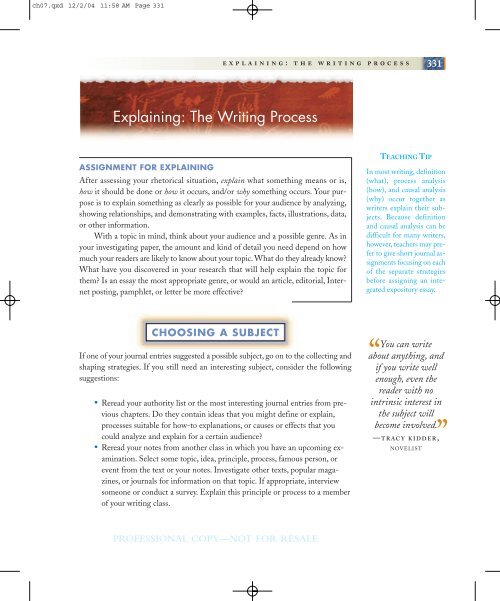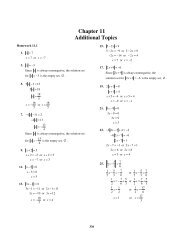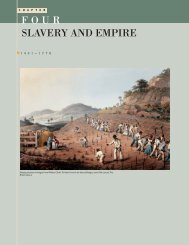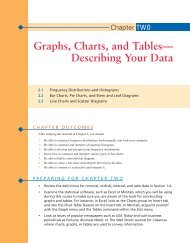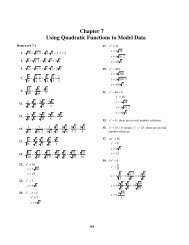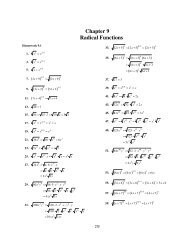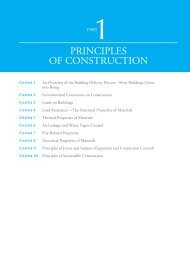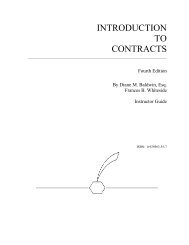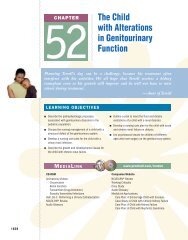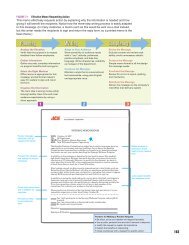A prolific painter of portraits before and after the French Revolution ...
A prolific painter of portraits before and after the French Revolution ...
A prolific painter of portraits before and after the French Revolution ...
You also want an ePaper? Increase the reach of your titles
YUMPU automatically turns print PDFs into web optimized ePapers that Google loves.
ch07.qxd 12/2/04 11:58 AM Page 331<br />
explaining:<br />
<strong>the</strong> writing process<br />
331<br />
Explaining: The Writing Process<br />
ASSIGNMENT FOR EXPLAINING<br />
After assessing your rhetorical situation, explain what something means or is,<br />
how it should be done or how it occurs, <strong>and</strong>/or why something occurs. Your purpose<br />
is to explain something as clearly as possible for your audience by analyzing,<br />
showing relationships, <strong>and</strong> demonstrating with examples, facts, illustrations, data,<br />
or o<strong>the</strong>r information.<br />
With a topic in mind, think about your audience <strong>and</strong> a possible genre. As in<br />
your investigating paper, <strong>the</strong> amount <strong>and</strong> kind <strong>of</strong> detail you need depend on how<br />
much your readers are likely to know about your topic. What do <strong>the</strong>y already know?<br />
What have you discovered in your research that will help explain <strong>the</strong> topic for<br />
<strong>the</strong>m? Is an essay <strong>the</strong> most appropriate genre, or would an article, editorial, Internet<br />
posting, pamphlet, or letter be more effective?<br />
TEACHING TIP<br />
In most writing, definition<br />
(what), process analysis<br />
(how), <strong>and</strong> causal analysis<br />
(why) occur toge<strong>the</strong>r as<br />
writers explain <strong>the</strong>ir subjects.<br />
Because definition<br />
<strong>and</strong> causal analysis can be<br />
difficult for many writers,<br />
however, teachers may prefer<br />
to give short journal assignments<br />
focusing on each<br />
<strong>of</strong> <strong>the</strong> separate strategies<br />
<strong>before</strong> assigning an integrated<br />
expository essay.<br />
CHOOSING A SUBJECT<br />
If one <strong>of</strong> your journal entries suggested a possible subject, go on to <strong>the</strong> collecting <strong>and</strong><br />
shaping strategies. If you still need an interesting subject, consider <strong>the</strong> following<br />
suggestions:<br />
• Reread your authority list or <strong>the</strong> most interesting journal entries from previous<br />
chapters. Do <strong>the</strong>y contain ideas that you might define or explain,<br />
processes suitable for how-to explanations, or causes or effects that you<br />
could analyze <strong>and</strong> explain for a certain audience?<br />
• Reread your notes from ano<strong>the</strong>r class in which you have an upcoming examination.<br />
Select some topic, idea, principle, process, famous person, or<br />
event from <strong>the</strong> text or your notes. Investigate o<strong>the</strong>r texts, popular magazines,<br />
or journals for information on that topic. If appropriate, interview<br />
someone or conduct a survey. Explain this principle or process to a member<br />
<strong>of</strong> your writing class.<br />
‘‘<br />
You can write<br />
about anything, <strong>and</strong><br />
if you write well<br />
enough, even <strong>the</strong><br />
reader with no<br />
intrinsic interest in<br />
<strong>the</strong> subject will<br />
become involved.<br />
’’<br />
— TRACY KIDDER,<br />
NOVELIST<br />
PROFESSIONAL COPY—NOT FOR RESALE


